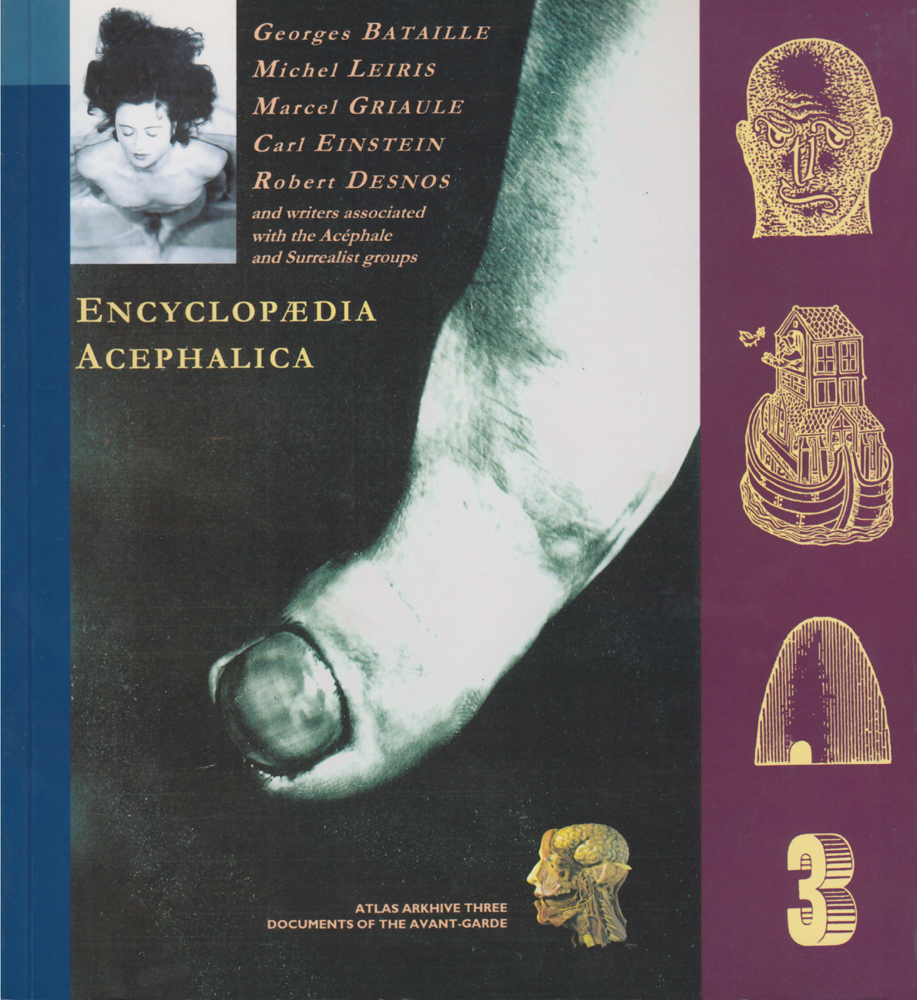Georges Bataille: Blue of Noon (1957–) [FR, EN, ES]
Filed under fiction | Tags: · death, eroticism, fascism, politics, sex, surrealism

“Set against the backdrop of Europe’s slide into fascism, this twentieth-century erotic classic takes the reader on a dark journey through the psyche of the pre-war French intelligentsia, torn between identification with the victims of history and the glamour of its victors. One of Bataille’s overtly political works, it explores the ambiguity of sex as a subversive force, bringing violence, power and death together in a terrifying unity. Written in 1935.”
Publisher Pauvert, Paris, 1957
215 pages
English edition
Translated by Harry Matthews
Publisher Marion Boyars, London, 1979
This edition Paladin Books, 1988
ISBN 0586086242
155 pages
Review: Kirkus (1979).
Commentary: David Fieni (2003).
Le bleu du ciel (French, 1957/1971)
Blue of Noon (English, trans. Harry Matthews, 1979, HTML, PDF)
El azul del cielo (Spanish, n.d.)
Mel Gordon: Voluptuous Panic: The Erotic World of Weimar Berlin (2000–)
Filed under book | Tags: · 1920s, berlin, body, cabaret, desire, drugs, eroticism, fetish, occultism, pornography, sex, sexuality, weimar republic

This sourcebook of rare visual documents and study of pre-Nazi, Cabaret-period “Babylon on the Spree” has the distinction of being praised both by scholars and avatars of contemporary culture.
Publisher Feral House, Los Angeles, 2000
Expanded edition, 2006
ISBN 1932595112
303 pages
Review: Lemons (Salon, 2000).
PDF, PDF (64 MB, updated on 2018-5-8)
See also Karl Toepfer, Empire of Ecstasy: Nudity and Movement in German Body Culture, 1910-1935, 1997.
Comment (0)Bataille, Leiris, Griaule, Einstein, Desnos, et al.: Encyclopædia Acephalica (1995)
Filed under book | Tags: · avant-garde, death, eroticism, materialism, surrealism

“The present volume contains two works: the Critical Dictionary first appeared in the magazine edited by Bataille, Documents, the second series of texts, the Da Costa Encyclopédique, was published anonymously after the liberation of Paris in 1947 by members of the Acéphale group and writers associated with the Surrealists. Both cover the essential concepts of Bataille and his associates: sacred sociology; scatology, death and the erotic; base materialism; the aesthetics of the formless; sacrifice, the festival and the politics of the tumult etc: a new description of the limits of being human. Humour, albeit, sardonic, is not absent from these remarkable redefinitions of the most heterogeneous objects or ideas: Camel, Church, Dust, Museum, Spittle, Skyscraper, Threshold, Work – to name but a few.
The Documents group was celebrated for joining together artists, authors, sociologists and ethnologists (among the most important of their time) in a literary and philosophical project. The Acéphale group was more mysterious, even its membership is only vaguely known, and its activities remain secret. The origins of the Da Costa only became known in 1993, the present volume reveals for the first time its principal compilers: Robert Lebel, Isabelle Waldberg and Marcel Duchamp, even so, the identity of the authors of a large part of it remain unknown.”
Assembled and introduced by Alastair Brotchie
Biographies by Dominique Lecoq
Translated by Iain White, et al.
Publisher Atlas Press, London, 1995
Atlas Arkhive: Documents of the Avant-Garde series, 3
ISBN 0947745872
176 pages
via esco_bar
PDF (removed on 2019-7-24 upon request from publisher)
See also scans of all issues of the magazines Documents and Acéphale on Monoskop wiki.
Comment (0)
